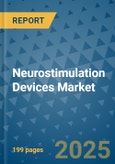Market Insights
Neurostimulation devices are gaining traction for their efficacy in managing chronic pain, Parkinson’s disease, epilepsy, depression, and other neurological disorders. These devices use electrical impulses to stimulate specific parts of the nervous system, providing relief where conventional therapies fall short.Key product innovations such as spinal cord stimulators (SCS), deep brain stimulators (DBS), vagus nerve stimulators (VNS), and wearable neurostimulation devices are redefining modern medical care. Their ability to offer drug-free, targeted treatment has spurred their adoption across hospitals, clinics, and even homecare settings.
Drivers
The market is being propelled by several critical factors. The rising prevalence of neurological disorders is the most significant among them. Globally, Parkinson’s disease affects an increasing percentage of the population, especially individuals over 60. Neuropathic pain, failed back surgery syndrome, and other chronic pain conditions are also becoming more common, demanding effective therapeutic solutions.The shift toward non-pharmacological treatments amid growing concerns over opioid dependency is driving demand for neurostimulation therapies. Devices such as spinal cord stimulators and transcutaneous electrical nerve stimulation (TENS) units are being increasingly used as alternatives to painkillers, with proven benefits in patient outcomes and safety profiles.
In addition, favorable reimbursement policies in developed regions like North America and Europe have improved patient access to these devices. Medicare and private insurers are now offering coverage for treatments such as SCS and dorsal root ganglion stimulation (DRG), further supporting market expansion.
Business Opportunity
One of the most promising opportunities in the neurostimulation devices market lies in wearable technologies. Companies are developing compact, user-friendly devices that enable patients to manage their symptoms at home. Products such as Quell® and CEFALY are examples of wearable solutions that offer pain relief and migraine management without medications.Wearable neurostimulation devices present a scalable opportunity for market players to reach a broader consumer base. With their convenience, non-invasiveness, and lower cost compared to surgically implanted alternatives, wearables are poised to transform the way chronic conditions are managed.
Digital integration is also emerging as a transformative trend. Devices embedded with remote monitoring, AI algorithms, and patient-specific programming are opening new frontiers in personalized care. These features not only enhance clinical efficacy but also align with global healthcare systems’ shift toward remote and preventive medicine.
Regional Analysis
North America is expected to dominate the global neurostimulation devices market throughout the forecast period. The region benefits from strong healthcare infrastructure, technological advancement, and high awareness among healthcare professionals and patients. Adoption of invasive treatments such as deep brain stimulation and spinal cord stimulation is high in the U.S., supported by robust clinical data and insurance backing.Europe follows closely, driven by favorable government policies, aging demographics, and rising incidence of neurological disorders. The presence of leading medical device manufacturers in countries like Germany and the U.K. further strengthens the region's market position.
Asia Pacific, while still emerging, is exhibiting significant potential due to rising healthcare investments, growing awareness, and increasing burden of chronic diseases. However, challenges such as limited insurance coverage and high device costs continue to restrict rapid growth in low- and middle-income economies.
Key Players
The global neurostimulation devices market is moderately consolidated, with a mix of established medical device giants and emerging innovators. Key companies contributing to market growth include:
- Medtronic
- Abbott
- Boston Scientific Corporation
- Cochlear Inc.
- NeuroPace Inc.
- NDI Medical LLC
- MED-EL Medical Electronics
- NeuroSigma Inc.
Recent Developments
In January 2024, Medtronic received FDA approval for its Percept™ RC DBS system, enhancing its neuromodulation offerings with improved rechargeability and directional lead capabilities.NeuroSigma Inc. received FDA clearance for its second-generation Monarch eTNS System for pediatric ADHD, marking a breakthrough in non-invasive neurostimulation for children.
Boston Scientific announced a US$ 3.4 billion acquisition of Axonics, aiming to expand its footprint in neuromodulation devices for bowel and urinary dysfunctions.
Market Challenges
Despite its promise, the neurostimulation devices market faces certain hurdles. High upfront and maintenance costs of devices limit adoption, particularly in emerging economies. The development and implantation of these devices require specialized training and equipment, further adding to the cost burden.Inadequate awareness in developing regions also hampers penetration. Lack of familiarity among healthcare providers and patients restricts the adoption of both invasive and wearable solutions. Insurance coverage remains uneven globally, preventing patients from accessing these innovative treatment options.
Future Outlook
The future of the neurostimulation devices market looks promising, driven by ongoing innovations and increasing demand for alternatives to conventional pain and neurological therapies. The trend toward personalized medicine, supported by digital and wearable technologies, will further enhance treatment outcomes and drive market growth.As healthcare systems around the world prioritize value-based care, neurostimulation devices that offer proven efficacy, reduce hospital visits, and improve quality of life will gain prominence. Market players that invest in emerging technologies, expand access through affordable models, and build strong distribution networks in underpenetrated regions are likely to lead in the coming decade.
Market Segmentation
By Product Type
- Spinal Cord Stimulators (SCS)
- Deep Brain Stimulators (DBS)
- Vagus Nerve Stimulators (VNS)
- Sacral Nerve Stimulators
- Transcranial Magnetic Stimulation (TMS) Devices
- Transcutaneous Electrical Nerve Stimulation (TENS) Devices
By Application
- Pain Management
- Epilepsy
- Depression
- Parkinson’s Disease
- Others
By End User
- Hospitals
- Clinics
- Homecare Settings
- Research Institutes
By Region
- North America
- Europe
- Latin America
- Asia Pacific
- Middle East and Africa
This product will be delivered within 1-3 business days.
Table of Contents
Companies Mentioned
- Medtronic
- Abbott
- Boston Scientific Corporation
- Cochlear Inc.
- NDI Medical LLC
- NeuroPace Inc.
- MED-EL Medical Electronics
- NeuroSigma Inc.








